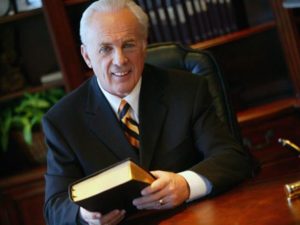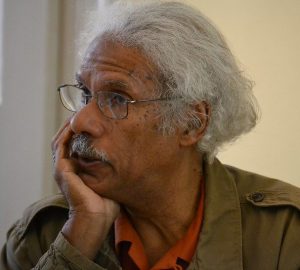Donald Trump is in the news again making negative statements about American Jews while flattering his evangelical fanbase.
In my piece last week, I wrote about how the dispensationalist obsession with the end times led evangelicals to embrace the Christian Zionist beliefs that “modern-day Israel is fulfilling biblical prophecy and that Israel should receive special treatment from American politicians.”
Five days later, Trump logged on to the Truth Social app to talk about evangelical support for Israel in contrast to American Jews who don’t support him.
“No President has done more for Israel than I have. Somewhat surprisingly, however, our wonderful Evangelicals are far more appreciative of this than the people of the Jewish faith, especially those living in the U.S. Those living in Israel, though, are a different story — Highest approval rating in the World, could easily be P.M.!” Trump boasted. Then he concluded, “U.S. Jews have to get their act together and appreciate what they have in Israel — Before it is too late!”
Trump’s history on Israel
Despite the fact that his daughter Ivanka and son-in-law Jared Kushner are Jewish, this isn’t the first time Trump has made controversial statements about American Jews or has spoken glowingly of evangelical support of Israel.
“This isn’t the first time Trump has made controversial statements about American Jews.”
At a rally in 2017 after his announcement about moving the capital of Israel to Jerusalem, Trump said: “That’s for the evangelicals. You know, it’s amazing with that — the evangelicals are more excited by that than Jewish people.”
In 2018, Trump told American Jews that Israel is “your country.”
During a meeting in the Oval Office in 2019, Trump said: “I think any Jewish people that vote for a Democrat, I think it shows either a total lack of knowledge or great disloyalty.” The next day, he added, “If you vote for a Democrat, you’re being very disloyal to Jewish people and you’re being very disloyal to Israel. And only weak people would say anything other than that.”
Then in 2021, Trump told Barak Ravid in a podcast: “The evangelical Christians love Israel more than the Jews in this country. … The Jewish people, and I’ve said this for a long time, the Jewish people in the United States either don’t like Israel or don’t care about Israel.”
But American Jews voting against Trump doesn’t mean they don’t care about Israel. Despite Trump’s accusations, Pew Research reported in 2020 that 82% of American Jews believe that caring about Israel is either important or essential, while just 16% say it is unimportant.
There will be many reflections on the antisemitic nature of Trump’s words, his veiled threats and the connections between Christian nationalism and Christian Zionism. And such analysis is needed.
But while evangelicals fawning over Israel receiving special treatment from Republican politicians may surprise Trump, it shouldn’t surprise us.
“Trump is correct in connecting evangelicalism to support for Republican policies toward Israel.”
Trump is correct in connecting evangelicalism to support for Republican policies toward Israel. Despite Trump’s surprise, there are theological reasons for this going back to the origins of Christianity. And until we acknowledge the theological assumptions and generational wounds that are fueling evangelical obsessions with Trump and the end times, he and those like him will continue to be elected.
In the beginning, there was apocalyptic literature
More than 2,000 years before modern evangelicals were promoting Christian Zionism, the people of Israel were processing their covenant relationship with God in the aftermath of their return from Babylonian exile. Biblical scholar Pete Enns says the question they were asking was, “After all this time, is God still with us?”
From the second century B.C. to the second century A.D., the ancient genre of apocalyptic literature attempted to explore God’s plan for Israel and the end of the world. Examples of apocalyptic literature would be 1 Enoch, 4 Ezra, 2 Baruch, the Testament of Moses, the Apocalypse of Abraham, and the book of Daniel.
While the four Gospels technically are a separate genre of literature known as Greco-Roman biography, they contain apocalyptic dialogue and imagery through the life and teaching of Jesus. According to the Dictionary of Jesus and the Gospels, “Taken together, these four aspects — emphasis on supernatural revelation, pronounced belief in the activity of angels and demons, focus on the invisible spiritual realms, forecasts of the end of this world — are what have led many to associate Jesus in the Gospels with the early Jewish outlook known as apocalypticism.”
The apocalyptic death of Jesus
While Jesus’ life and teaching reflected character traits of apocalyptic prophecy, his death and resurrection were written about in apocalyptic language as well. The Dictionary of Jesus and the Gospels points out that the Gospel narratives about Jesus’ death and resurrection “are accompanied by all of the typical trappings of the end of the age in Jewish apocalypticism: the darkening of the sun’s light (Mark 15:33); various earthquakes (Matthew 27:51; 28:2-4); the rending of the veil in the temple, signifying its demise (Mark 15:33); the confession of faith in Israel’s God by representatives of the Gentiles (Matthew 27:54); the appearance of angels (Matthew 28:2-4); and, of course, the bodily resurrection of Jesus (Matthew 28; Mark 16; Luke 24), in which the bodily resurrection that was expected for all Israel at the end of the age was accomplished in the person of Jesus on Easter. Indeed, in the Gospel of Matthew, the death of Jesus is so efficaciously eschatological that it actually triggers the bodily resurrection of ‘the holy ones,’ who come forth from their ‘tombs’ after his individual resurrection (Matthew 27:51-53).”
Jesus’ view of the end times
But while the authors of the Gospels may have utilized a variety of apocalyptic images in their different narratives, perhaps a more important question is what Jesus would have thought about the end times.
“Perhaps a more important question is what Jesus would have thought about the end times.”
The most concerning problem is when Jesus appears to make what some consider to be the first failed end-times prediction. In Matthew 16:27, Jesus says, “There are some standing here who will not taste death before they see the Son of Man coming in his kingdom.” In Matthew 24:34, Jesus says, “This generation will not pass away until all these things have taken place.” Then in Luke 9:26-27, Jesus says, “Those who are ashamed of me and my words, of them the Son of Man will be ashamed when he comes in his glory and the glory of the Father and of the holy angels. But truly I tell you, there are some standing here who will not taste death before they see the kingdom of God.”
So did Jesus make a failed end-times prediction?
The New Interpreters Study Bible says that Jesus’ prophecy “is not accurate, but it warns and reassures disciples of Jesus’ imminent return and the triumph of God’s empire.”
The ESV Study Bible says Jesus’ prophecy most likely was referring to the transfiguration rather than to the second coming.

The Thomas More Society released this photo of pastor John MacArthur holding a Bible along with the news release of their legal representation.
But John MacArthur says in his study Bible that Jesus could not have been referring to the people literally standing there at the time because “‘all these things’ … did not ‘take place’ in their lifetime.” So MacArthur concludes: “It seems best to interpret Christ’s words as a reference to the generation alive at the time when those final hard labor pains begin.”
Christianity’s wound of missed expectations
Many modern evangelicals see themselves as that generation and, consequently, as characters in the apocalyptic literature of the Gospels.
But the connection between modern evangelicals and first century followers of Jesus goes deeper than a mental hyperlink in biblical interpretation.
“The connection between modern evangelicals and first century followers of Jesus goes deeper than a mental hyperlink in biblical interpretation.”
When Jesus died, his disciples struggled with unmet expectations. These were the same disciples who had been arguing over who would be the greatest in the kingdom. But rather than reigning, Jesus was dead. And in the midst of grieving, his disciples were disappointed and in danger.
Some might say Jesus incorrectly predicted the end times, while others insist he was speaking of something else. Some might call Jesus an apocalyptic prophet concerned about an otherworldly kingdom coming into our world, while others may see him as more akin to a social justice warrior, declaring that the kingdom already was here in our midst as we love our neighbors.
There may be elements of truth in a variety of interpretations. And perhaps none of them fully encapsulate everything that Jesus meant. The more you study what biblical scholars are wrestling with, the more you realize how complicated our processing of what happened and what it meant can be. Despite the confident proclamations of men like MacArthur, the Bible is simply not “crystal clear.”
But one thing that does seem to emerge amidst our struggle is the reality that Christians throughout time have been marked with the same wound of disappointment and fear that the disciples had. Even the early Christians who believed in the resurrection had to deal with the disappointment and fear that came from the ascension and disappearance of Jesus rather than the visible establishment of his reign on the earth. And as time went on, the wound of disappointment festered.

David Bentley Hart
In his book Tradition and Apocalypse, David Bentley Hart says: “It does not seem foolish to suspect that Christian dogma has always had some quality of disappointment about it, some impulse to anger, some sense that a creed is a strange substitute for the presence of the Kingdom. … The Kingdom was preached, but it was the church, with its often almost comically corrupt and divisive institutional form, that arrived. The Kingdom did not come — not in the fashion expected, at least, not in the time allotted, not in the twinkling of an eye — and so the ever more visibly hierarchical and depressingly mundane civic institution of the church became the only concrete tangible form that Christian hope and expectation could now take in this prolonged interval of indefinite delay.”
Christianity’s anti-Jewish attitude
The people of Israel had their own indefinite delay, having spent centuries longing for Jerusalem to be the home where the covenant promises of land, temple, and king were fulfilled.
But Christianity claimed to fulfill what the Hebrew Bible prophesied and reframed many ancient Jewish concerns and Scriptures as predictive of Christian theology. So a rift began to grow between Christianity and Judaism and even within Christianity itself.
Church historian Justo Gonzalez says in The Story of Christianity that on one hand, Christians believed Jews should convert to Christianity. But on the other hand, some Christians wanted “to go back to their Jewish roots in ways that the leadership of the church considered inappropriate.” As a result, Gonzalez says, the church leaders began to write treatises and sermons that “did promote among Christians an anti-Jewish attitude that would have nefarious consequences in subsequent times.”
The hierarchy of supersessionism
The discussion about ultimate truth set up a hierarchy of religions where one religion is seen as above, or more true, than another. The Latin word “super” means “above,” while the Latin word “sedere” means “to sit.” So the way this plays out between Judaism and Christianity is through supersessionism, which sees Christianity as sitting above, superior to or replacing Judaism.
“Supersessionism sees Christianity as sitting above, superior to or replacing Judaism.”
It is similar to how Islam is seen as superior to or replacing Christianity, or to how Mormonism is considered superior to or replacing previous Christian theology.
When followers of a religion consider their religion superior to or replacing another, it affects how they see the followers of the earlier religion. In The God of Israel and Christian Theology, Kendall Soulen suggests three main Christian supersessionist postures toward Judaism:
- Economic Supersessionism — “Carnal Israel’s history is providentially ordered from the outset to be taken up into the spiritual church.”
- Punitive Supersessionism — “God has rejected carnal Israel on account of its failure to join the church.”
- Structural Supersessionism — “The Hebrew Scriptures (are) largely indecisive for shaping Christian convictions about how God’s works as Consummator and as Redeemer engage humankind in universal and enduring ways.”
Seeing Christianity’s embrace of power from below
Once a hierarchy has been established, especially amidst wounds of disappointment, the result is an embrace of power over others.
Of course, Christians can create theological systems to justify theological superiority over everyone else. But followers of Jesus from the underside of power have a different lens for being present in the world.
In Jesus and the Disinherited, Howard Thurman says: “Christianity as it was born in the mind of this Jewish teacher and thinker (Jesus) appears as a technique of survival for the oppressed. That it became, through the intervening years, a religion of the powerful and dominant, used sometimes as an instrument of oppression, must not tempt us into believing that it was thus in the mind and life of Jesus.”

Albert Raboteau
Albert Raboteau wrote for the Boston Review: “African American Christianity has continuously confronted the nation with troubling questions about American exceptionalism. Perhaps the most troubling was this: ‘If Christ came as the Suffering Servant, who resembled him more, the master or the slave?’ Suffering-slave Christianity stood as a prophetic condemnation of America’s obsession with power, status and possessions. African American Christians perceived in American exceptionalism a dangerous tendency to turn the nation into an idol and Christianity into a clan religion.”
Reflecting on the words of Thurman and Raboteau, Dennis Edwards says in Might From the Margins: “Those who have been oppressed are the best teachers of the way of Christ. Consequently, I would much rather heed the voice of a slave, or listen to a marginalized immigrant follower of Jesus, than model myself after a Christian leader who boasts of being close to the president of the United States.”
Projecting the threat of power from above
Those at the top of the religious hierarchies — most notably white conservative evangelical men — have a different view of their theological towers than those below.

Kristin Du Mez
In Jesus and John Wayne, Kristin Du Mez discusses the words of President George W. Bush regarding crusades against Islam after the Sept. 11, 2001, attacks, noting that: “To conservative evangelicals, such language made perfect sense.”
Du Mez goes on to point out how men such as Franklin Graham, Pat Robertson, James Dobson and Ted Haggard “began to characterize Islamic fundamentalism as one of the most serious threats to American families, explaining that ‘the security of our homeland and the welfare of our children’ were, after all, ‘family values.’”
She also observed that “in the fall of 2002 … two-thirds (of evangelical leaders) also believed that Islam was ‘dedicated to world domination.’”
“Is it any wonder that a group of men who believe they have a divine right to wield authority over the world would see others as a threat?”
Is it any wonder that a group of men who believe they have a divine right to wield authority over the world would see others as a threat? These men are projecting onto others what they already have done and desire to do more of themselves.
Rachel Tabachnick shows how, in the context of Judaism, Christian Zionists utilize “blowing shofars, wearing tallitot (prayer shawls), singing in Hebrew, holding Holocaust remembrances, and celebrating Christianized versions of Jewish holidays” as a way of getting Rabbinic Jews to listen to them. But as Tabachnick points out, when their words and theology of the end times are examined more closely, it becomes clear that “a prerequisite for peace on earth is eradicating Rabbinic Judaism. Stated another way, in this narrative the obstacle to a glorious ‘Kingdom on earth’ — free of sickness, death, destruction, and misery — is Jews who refuse to convert.”
The intergenerational apocalyptic wounds of Christian Zionism
There are plenty of political and religious leaders who need to be exposed today for the way they are garnering power over others by stoking fears about American Jews and the end times.
But as we connect the dots, we need to realize there are 2,000 years of intergenerational apocalyptic wounds that have evolved us into the traumatized, power-grasping people we are today.
When the Roman soldiers arrested Jesus in Gethsemane, Peter drew his sword and struck off the ear of the Jewish high priest’s servant. The apocalyptic expectations of Jesus’ followers paired with the apocalyptic nature of his death, and his going away led to a wound of disappointment that still causes the hearts of his followers to ache. But rather than being present in the suffering of our apocalyptic ache and serving our neighbors, we have built many sacralized hierarchies of power, one of which wields superiority over our Jewish neighbors.
David Bentley Hart is correct in pointing out the “disappointment … (and) impulse to anger” that has marked Christian theology from the very beginning. But as James Cone wrote in Said I Wasn’t Gonna Tell Anybody: The Making of a Black Theologian, “Your anger is how theology begins. It starts with anger about a great contradiction that can’t be ignored.”

Rick Pidcock
Rick Pidcock is a 2004 graduate of Bob Jones University, with a Bachelor of Arts degree in Bible. He’s a freelance writer based in South Carolina and a former Clemons Fellow with BNG. He recently completed a Master of Arts degree in worship from Northern Seminary. He is a stay-at-home father of five children and produces music under the artist name Provoke Wonder. Follow his blog at www.rickpidcock.com.
Related articles:
Robert Jeffress says Trump ‘on the side of God’ with Israel embassy move


